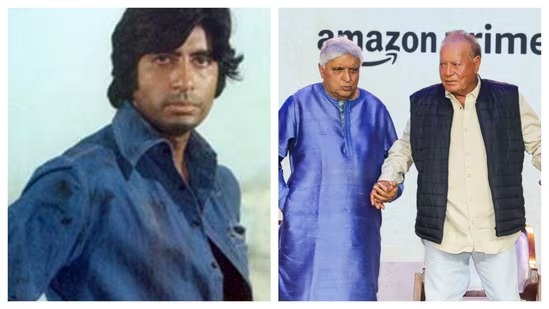- September 8, 2024
Amitabh Bachchan could have stopped my split with Javed Akhtar, says Salim Khan

The world of Bollywood has witnessed many partnerships that have shaped its legacy, but few were as impactful as the legendary writing duo Salim-Javed. Salim Khan and Javed Akhtar, often hailed as the architects of commercial Hindi cinema, created iconic scripts that defined the industry in the 1970s and 1980s. Their movies, including blockbusters like “Sholay,” “Deewar,” and “Zanjeer,” changed the landscape of Indian cinema forever, setting the benchmark for storytelling and character development. However, the partnership ended abruptly in 1982, shocking the industry and fans alike. In a recent interview, Salim Khan made a surprising revelation, stating that Amitabh Bachchan, a close friend of both writers and a key figure in their success, could have played a role in preventing their split. This statement has stirred up nostalgia and speculation about what might have been if the most iconic writing partnership in Bollywood had continued. This article delves into the history of Salim-Javed, their remarkable journey, the dynamics of their split, and Salim Khan’s thoughts on how Amitabh Bachchan might have influenced their story differently. Salim Khan, a former actor struggling to find his footing in the film industry, and Javed Akhtar, a young and ambitious writer from a humble background, first crossed paths in the 1960s. Their partnership began serendipitously when they worked on the film “Sarhadi Lootera” (1966), where Salim was an actor, and Javed served as an assistant writer. Recognizing their complementary skills—Salim’s knack for storytelling and Javed’s mastery over dialogue—they decided to collaborate as scriptwriters. The duo’s first major breakthrough came with the film “Andaz” (1971), starring Shammi Kapoor, Rajesh Khanna, and Hema Malini. While the film was a success, it was the subsequent movies “Haathi Mere Saathi” (1971) and “Seeta Aur Geeta” (1972) that truly established Salim-Javed as the go-to writers in Bollywood. However, it was their collaboration with Amitabh Bachchan that cemented their status as the most formidable writers in the industry. Amitabh Bachchan’s career had not taken off until Salim-Javed wrote “Zanjeer” (1973), a movie that redefined his image and introduced the iconic “Angry Young Man” persona. Salim-Javed’s scripts were tailored perfectly for Bachchan’s brooding intensity and towering screen presence. The trio became a formidable force in Bollywood, delivering a string of superhits that included “Deewar” (1975), “Sholay” (1975), “Trishul” (1978), “Don” (1978), and “Kala Patthar” (1979). The success of these films not only elevated Bachchan to superstardom but also turned Salim-Javed into the first-ever scriptwriters to demand star-like fees and on-screen credits, something unprecedented at the time. Their collaboration was symbiotic; Bachchan needed Salim-Javed’s gripping stories, and they needed his larger-than-life presence to bring their characters to life. Despite their enormous success, cracks began to appear in the partnership. The reasons for the split have been the subject of much speculation over the years. Creative differences, diverging personal philosophies, and growing egos are often cited as factors. In various interviews, both Salim Khan and Javed Akhtar have refrained from pointing fingers, instead acknowledging that their paths had naturally diverged. Salim Khan has always been candid about the fact that their partnership ended on a bitter note. However, both writers went on to build successful individual careers—Salim Khan as a scriptwriter and a mentor to his sons Salman, Arbaaz, and Sohail Khan, and Javed Akhtar as a celebrated lyricist, poet, and screenwriter. The end of Salim-Javed was a significant loss to Bollywood, as the duo never managed to recreate the magic of their combined efforts on their own. Salim Khan’s recent statement that Amitabh Bachchan could have prevented the split adds an intriguing dimension to this story. According to Khan, Bachchan was not just a collaborator but also a close confidant and friend to both writers during the height of their careers. Salim expressed that if Bachchan had intervened, given his rapport with both writers, he might have been able to mediate and resolve their differences.



